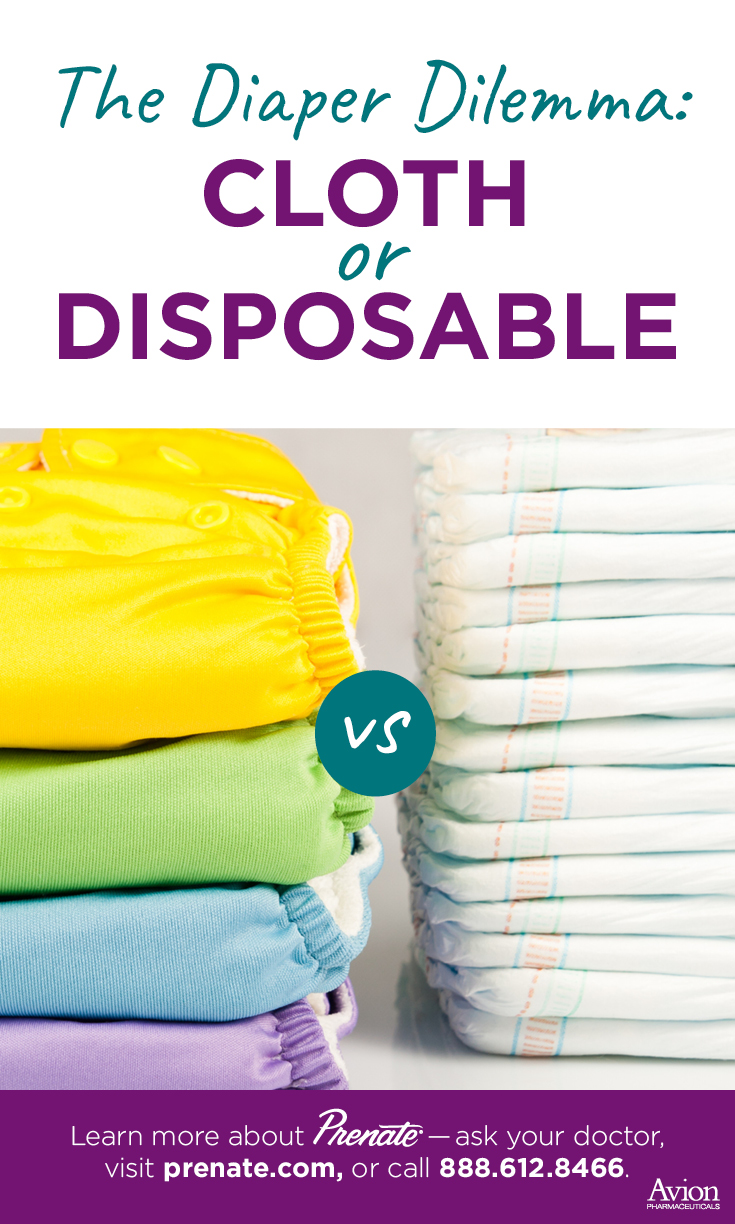Cloth vs Disposable Diapers
July 24, 2020
When preparing for your baby’s arrival, choosing between cloth or disposable diapers can feel like a decision between what’s best for your family and the environment. With parents aiming to make a more socially responsible choice1, cloth diapers have experienced a resurgence in popularity, but they may not be the best choice for every family.The Case for Cloth Diapers
The most common reason parents opt for cloth diapers over disposable ones has to do with protecting the environment. Most conventional single-use diapers are made from plastic-based ingredients, and since plastic is not biodegradable, they can take as long as 500 years to fully decompose in a landfill. This is only an estimate, however, since single-use diapers only hit the mass market in 1948. According to some experts, not enough time has passed to get an accurate idea of how long it truly takes for disposable diapers to break down.2
Parents who are environmentally conscious may be drawn to the cloth diaper option to reduce waste and prevent excess plastic materials from leaching into the soil. Cloth diapers may also offer a financial advantage over their single-use counterparts. It is estimated that babies will go through 2,500 to 3,000 disposable diapers in their first year alone.2 Not only does that produce a lot of trash; it also represents a lot of cash. The total cost of disposable diapers for the average family is somewhere around $1,500 to $2,000 for one baby.2
While cloth diapers may seem like the more expensive option in the beginning, parents who stick with them can potentially save money in the long run. According to some economists, parents typically don’t see any real savings in the first year of using cloth diapers. The initial costs can be pretty steep, with cloth diaper startup costs running around $500. Add in the extra cost of electricity and water needed to wash and dry the diapers and the savings are practically nonexistent in the first year. However, parents can start to see more substantial savings in the second year, and the savings will be even more beneficial if they use cloth diapers for their next baby.3
The Disposable Debate
Disposable diapers may not be the most eco-friendly choice, but let’s face it: most parents are overwhelmed as it is with a new baby in the family, and anything that makes their lives easier isn’t necessarily a bad thing. While cloth diapers can be reused, they require washing and drying, which takes time – something parents don’t have much of when raising children, working, going back to school, and so forth. Plus, diapers (whether they are cloth or not) need to be changed frequently. Families who choose cloth diapers will need to plan ahead to make sure they have enough clean diapers available for the day to avoid having to do a rush load of laundry.
Speaking of laundry, if you are living in an area that is experiences droughts or often enforces water-use restrictions, cloth diapers may be impractical. This also presents a challenge to the eco-friendly claim of the cloth diaper movement. Although cloth diapers may reduce landfill waste, the water required to clean them may cancel out their environmental friendliness. Similar to the financial benefit, the environmental impact of cloth diapers is only significant if the consumer commits to their use for multiple years or multiple children. Cloth diapers can also be quite cumbersome, as some styles are bulky, making it difficult for parents to accurately size their newborn’s clothing.4
Finding a Middle Ground
Not all disposable diapers are created equal. While the typical single-use diaper is made with plastic-based ingredients, there are options for disposable diapers that are eco-friendlier.
Biodegradable or compostable diapers are marketed as a middle ground between the convenience of disposable and the socially responsible cloth option. These diapers are usually made from bamboo, sustainably harvested wood pulp, or other materials that can naturally break down and eventually turn into soil. However, even diapers that are marketed as “biodegradable” may not be able to fully biodegrade, due to synthetic ingredients present in the final product. No matter what, whether you choose bio-degradable diapers or conventional disposable diapers, the used ones will likely end up in a landfill. While biodegradable options are a little less harmful to the planet, they are often not as eco-friendly as they appear.
Another option is the compostable diaper, which is similarly misleading in its name. Since consumers must dispose of used diapers in the trash, most “compostable” diapers don’t get composted, unless the consumer uses a professional diaper composting service. These services offer parents compostable diaper products as well as a pickup service. Parents place used diapers in a bag outside and a service employee picks them up and takes them to a biosolids composting facility. This ensures that the diapers never end up in a landfill, helping reduce their environmental impact. However, the added expense of using this type of service may not be practical for some families.4
Many families choose to find a happy medium between cloth and disposable diapers by using both. For example, parents may choose to start small with a cloth diaper kit but use disposables as backups. Likewise, some parents may choose to use cloth diapers with disposable inserts.
The bottom line is, when it comes to choosing diaper products, there is no one-size-fits-all answer. Families should weigh the pros and cons and find the option that works best for their lifestyle.
Prenate® Vitamin Family
This post is sponsored by the Prenate® Vitamin Family, a line of prescription prenatal supplements designed to enhance preconception, prenatal and postpartum nutrition in women. Talk with your doctor about how taking a daily prescription prenatal or postnatal vitamin could help support a healthy pregnancy and postpartum wellness.
You Are About To Leave This Website
By clicking continue, this link will take you to a website to which Alora Pharmaceuticals Policies & Terms of Use do not apply. Alora and its subsidiaries do not control the content or accuracy of third-party websites and assume no responsibility for their use.
















